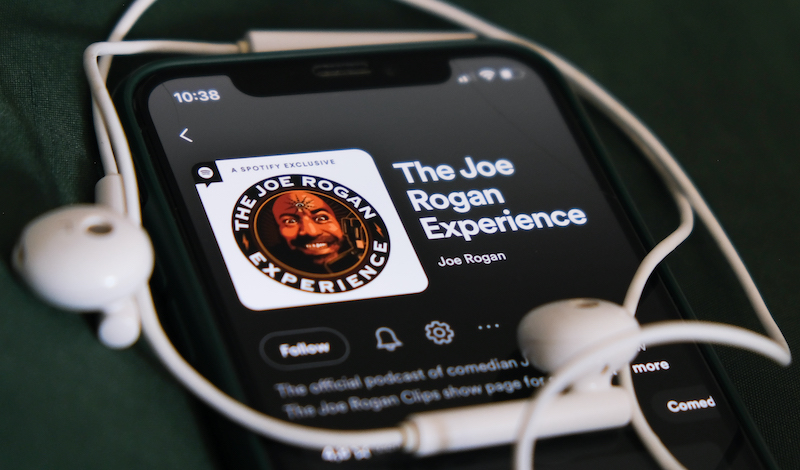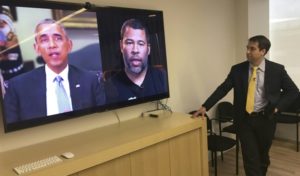
The U.S. government should do more to prevent the spread of disinformation via podcasts.
The Joe Rogan Experience—a podcast where comedian and Ultimate Fighting Championship commentator Joe Rogan interviews a wide range of guests—is a conundrum.
On one side of the debate, fans of Rogan applaud his commitment to interviewing a wide range of guests for an extended period of time in a purportedly unbiased manner. Some see podcasts such as Rogan’s as a foil to traditional forms of mainstream media that they have come to distrust.
On other side of the debate, though, critics chide Rogan for his amplification of controversial guests, some whom are said to advance harmful conspiracy theories and further the spread of COVID-19 misinformation. They also criticize Rogan for failing to check facts and operating without traditional journalistic oversight.
How should policymakers resolve this debate?
If hosting platforms such as Spotify fail to moderate podcasts peddling in disinformation, the U.S. government should do more to regulate this growing area of news consumption.
If podcasts were treated like traditional forms of broadcast media—radio, television, and satellite—they would be subject to oversight by the Federal Communications Commission (FCC). Although the FCC must operate within the bounds of the First Amendment’s speech and press protections, the FCC prohibits news broadcasters from distorting the news intentionally or from broadcasting false information that could contribute to public harm.
Podcasters, however, currently evade these prohibitions. But if the FCC and courts choose to adopt a definition of broadcast journalism that includes podcasts that distribute the news, podcast hosts could be required to obtain a license with the agency. This would bring these alternative forms of media under the FCC’s supervision, eliminating some of the problems with fact-checking and deliberate misinformation that can harm listeners.
Questions of line-drawing—such as when does a podcast cross into “news” territory, when does misinformation become deliberate or harmful, or can the FCC regulate other forms of online distribution—could complicate the solution of FCC supervision. But embarking on this delicate line-drawing journey would be preferable to the alternative future of over a quarter of people in the United States depending on news from an unregulated source.
Some of these debates are already underway with recent litigation surrounding Section 230 of the Communications Decency Act. This law gives platforms some immunity from information posted by third party users—but interpretations of the reach of this immunity has been heavily politicized as a choice between misinformation or censorship. Although this debate is ongoing, the FCC has made a case for its authority to interpret Section 230 in the absence of new legislation from Congress, which means platforms such as Spotify could be responsible for misinformation spread by hosts such as Rogan.
Concerns about First Amendment violations could be mitigated by the FCC applying its preexisting First Amendment safeguards, which the agency developed following a rich history of litigation interpreting its reach. In addition, the FCC could commit to limiting the restrictions against explicit and profane material with respect to podcasts.
Even if FCC oversight of podcasts ultimately remains in question, other agencies and tools for regulatory oversight should be explored.
The Federal Trade Commission (FTC), for example, regulates paid advertising content presented on podcasts and other online venues. Although these regulations do not cover all content within podcasts, they require hosts to be fully transparent about any endorsements and advertising content.
Expanding these advertising transparency requirements to relationships between the host and guests of the host’s show—which often benefit the guest by way of increased following and more customers, similar to an advertisement—could better control the vetting and context of information provided by guests. This expansion of regulation could circumvent First Amendment concerns because it would not restrict the speech of the guest but merely require for a disclosure about the relationship between the guest’s appearance on the show and the guest’s business ventures.
Currently, legislators are advancing bills aimed at keeping platforms from elevating harmful content. These bills, called algorithmic amplification bills, do not attempt to censor the underlying content but would limit platforms’ immunity from liability in the event the platforms amplify harmful content.
Platforms such as Spotify, which make big financial investments in podcasts such as Rogan’s, could be punished for using algorithms to amplify harmful content. Passage of new legislation regulating platforms’ amplification of misleading podcasts could provide for a less invasive method of ensuring content quality without directly interfering with podcasts themselves.
With any regulatory avenue taken, government agencies and Congress must carefully consider the tradeoff between potentially restricting speech and protecting listeners. This tradeoff could be addressed by clearly defining what qualifies as “news” or other important information—leaving entertainment and opinion to be untouched by regulators.
With public faith in media at all-time lows, and the spread of misinformation on the rise, the U.S. government must act now to oversee popular podcasts that seemingly present authoritative news.



